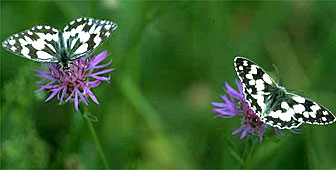Agreement reached over biodiversity

Nearly 200 countries, including Switzerland, have agreed on a plan to help protect the world's threatened plants and animals.
Forests, genetic resources and invasive alien species all featured at the top of the agenda during the two-week United Nations biodiversity conference in The Hague.
The conference, which was seen as an important milestone before September’s Earth Summit in South Africa, ended on Friday, with delegates agreeing on a proposal that aims uphold an agreement signed at the Earth Summit in Rio ten years ago.
The agreement prevents drug and biotechnology companies from plundering medicinal plant resources from developing countries.
Beat Nobs, head of the Swiss delegation in The Hague, told swissinfo that several important decisions had been taken at the summit.
“We agreed on access and benefit sharing on genetic resources and we reached an agreement on some principles to put in voluntary guidelines on access and benefit sharing,” he said.
No commitment
However, so far the guidelines are only voluntary and do not involve any binding commitment from nations.
“It is the first step in the direction of an international agreement that aims at overcoming an atmosphere of distrust that has been prevailing for the past year,” Nobs told swissinfo.
Whereas the 180 delegates taking part in the summit left satisfied with their fortnight’s work, the environmental organisation, Greenpeace, criticised the outcome of the conference.
“No landmark decision to protect ancient forests has been taken in The Hague,” said Greenpeace forest expert Martin Kaiser.
Little effect
The conference came amid growing criticism that the agreements signed by world leaders in Rio had failed.
The Convention on Biological Diversity was intended to protect the planet’s biological wealth; however, even though extinction trends in plants and animals are continuing, Nobs sees the new agreement as a major step forward in the protection process.
“The question of access and benefit exchange has to be tackled somehow and there was no question at this point to go beyond [what has been decided in Rio]. All the parties involved look at this as a major breakthrough as this relationship has finally been formalised,” he said.
The convention relies on cooperation between biologically rich tropical countries and economically richer nations in the industrialised world.
International guidelines
Nobs believes the agreement in The Hague will pave the way for improved international guidelines governing access to genetic resources as well as ensuring that resource-rich countries reap their just rewards.
“It is possible that a country in Latin America, for example, will pass legislation that requires foreign companies to comply to their rules and regulations,” he said.
However, when it comes to the survival of biodiversity, Nobs has his doubts. “I am not convinced that the loss of biodiversity will stop, and for this reason it is very important that we do everything to stop the loss of biodiversity,” he told swissinfo.
by Billi Bierling and Jonathan Summerton

In compliance with the JTI standards
More: SWI swissinfo.ch certified by the Journalism Trust Initiative
You can find an overview of ongoing debates with our journalists here . Please join us!
If you want to start a conversation about a topic raised in this article or want to report factual errors, email us at english@swissinfo.ch.